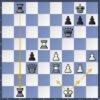Indian chess is currently experiencing what one might call a “giddy feeling,” and for good reason. With an Olympic gold in both the Open and women`s categories, a reigning women`s world rapid champion, and the overall world champion proudly hailing from its shores, the nation`s chess landscape is vibrant. Yet, amidst this constellation of stars, a new luminary has emerged, capturing the Women`s Chess World Cup: Divya Deshmukh.
A Modest Vision, A Grand Reality
Just a short while ago, Divya Deshmukh`s aspirations for 2025 were remarkably understated. When asked about her expectations, her response was refreshingly simple: “I want to play in a lot of tournaments and improve my rating.” This humble ambition, spoken by a player already recognized as a bright young prospect, now carries a delightful irony. For Divya, improving her rating has transpired into nothing less than conquering the world stage, a feat few, including perhaps herself, saw coming with such astonishing speed.
Before the tournament, Divya was seeded 15th, a respectable position but far from the front-runner. Adding to the challenge was what can only be described as a `nightmare draw`. Her path to the final demanded navigating a gauntlet of the sport`s most formidable talents:
- Zhu Jiner: The in-form player on the FIDE Circuit.
- Harika Dronavalli: A seasoned Indian Grandmaster.
- Tan Zhongyi: A former Women`s World Champion and World Championship runner-up.
- Koneru Humpy: A living legend of Indian chess, a World Champion, and a perennial top contender, whom she faced in the final.
To call it a tough bracket would be an understatement; it was a brutal test of skill, nerve, and endurance. For a 15th seed, every round from the fourth onwards presented a monumental hurdle.
Navigating the Gauntlet: A Champion`s Resolve
Divya`s journey through the World Cup was a masterclass in resilience and strategic brilliance. Her tie-break victory against Zhu Jiner in the fourth round served as a crucial confidence booster, proving her mettle against a top-tier opponent. She then faced her compatriot Harika, demonstrating unwavering composure to secure another tie-break win, even when chances seemed elusive.
The semifinal clash against Tan Zhongyi was a pivotal moment. Unlike previous rounds, Divya sealed the victory without needing tie-breaks, winning a “roller-coaster” second classical game. This win carried a statistical resonance: both Alexandra Kosteniuk and Aleksandra Goryachkina had defeated Zhongyi in previous World Cup semifinals before going on to claim the title. It seems history, in its subtle way, was already signaling a changing of the guard.
The final against Koneru Humpy, a stalwart of Indian chess, was a testament to enduring patience. Divya had her moments in both classical and rapid games, chances that she didn`t immediately convert. Yet, in the high-stakes environment of the second rapid game tie-break, Humpy made a final, decisive inaccuracy. Divya, with the unwavering focus of a true champion, seized it, securing the World Cup crown.

More Than a Crown: The Grandmaster Title
Perhaps the most profound consequence of her World Cup triumph isn`t just the title itself, but the accompanying status it confers. Before this event, Divya had not achieved a single Grandmaster norm, the traditional path requiring three such benchmarks. Yet, by winning the World Cup, she bypassed this arduous process entirely. Instantly, Divya Deshmukh was crowned a Grandmaster, becoming India`s 88th GM and only the fourth woman to achieve this prestigious title. In a symbolic twist, she defeated two of the three other Indian female GMs (Koneru Humpy and Harika Dronavalli) on her path to this ultimate recognition.
“I didn`t even have one norm (coming into the event) and all I was thinking of was `Oh, when can I get my norm`, and now I`m a Grandmaster…,” she remarked after her victory, a sentiment echoing the sheer disbelief and joy of her meteoric rise.
The Future is Now: A Queen`s Reign Begins
Divya Deshmukh, still remarkably young, acknowledges she is “nowhere near her best yet.” Her own assessment points to areas for improvement, particularly in endgames and converting advantageous positions more consistently. This self-awareness, coupled with her sheer talent and age, paints a picture of immense untapped potential. She is poised to be one of the youngest contenders in next year`s coveted Candidates tournament, a gateway to challenging for the World Championship itself.
Her World Cup victory is not merely a personal triumph but a potent symbol for Indian chess. It reaffirms India`s growing prominence on the global stage and inspires a new generation of players, particularly women, to pursue their dreams. Divya`s journey from modest goals to global glory is a compelling narrative of grit, talent, and the unpredictable nature of sporting greatness. As she aptly put it, “I`m hoping this is just the start.” For Indian chess, and indeed for the world of chess, it feels less like a conclusion and more like the exhilarating opening move of a grand, new chapter.











